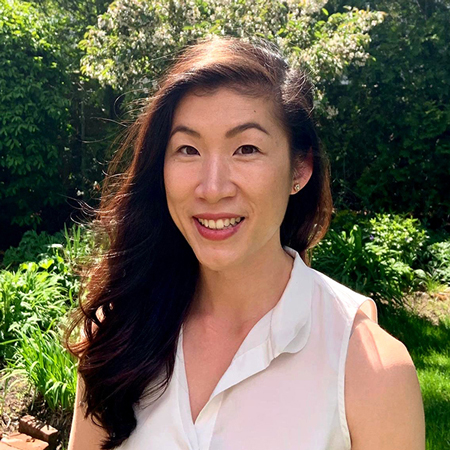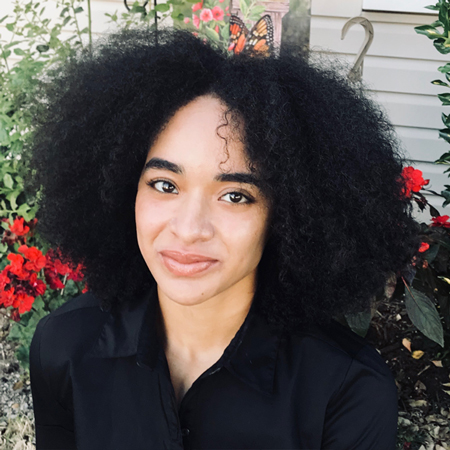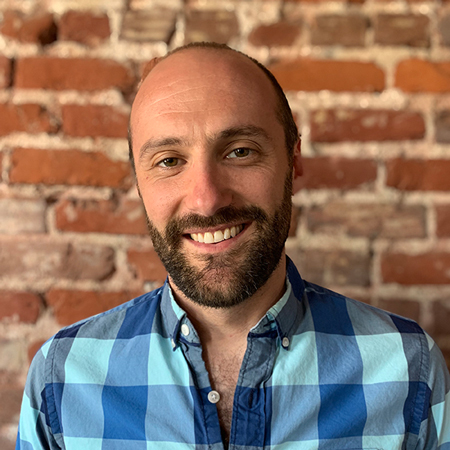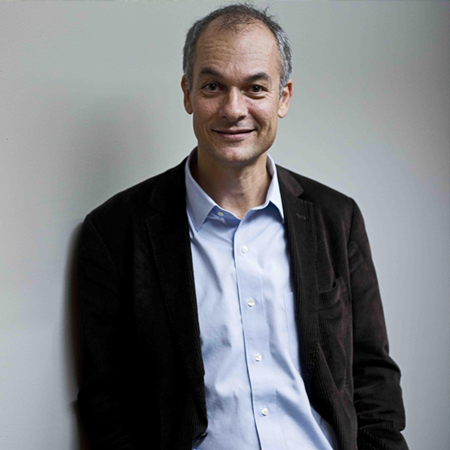 Felicia Renelus '21
Felicia Renelus '21
Undergraduate Student | Cognitive Science
At Brown, students have the freedom to create their own education—and Felicia Renelus has made sure to take full advantage of that freedom. Merging her interests in humanities and STEM (science, technology, engineering, and math) disciplines, she's been exploring the possibilities and nuances of cognitive science.
One of the highlights of her undergraduate experience has been "Simulating Reality: The (Curious) History and Science of Immersive Experiences"—one of Cogut's Undergraduate Collaborative Humanities Courses where faculty from different departments come together to explore interdisciplinary topics. "It was a class that brought together students with backgrounds from design to humanities to computer science. There were so many disciplines represented in that class and we were all engaging in different work about virtual reality, the history of it, the psychology behind it, and why we desire to have these immersive experiences," says Renelus.
WHY THE HUMANITIES MATTER:
"I think humanities courses are super important because they encourage us to analyze human nature and culture, not only from our past but our present."
 Kelly Nguyen
Kelly Nguyen
Graduate Fellow | Classics
What do Ancient Greece and Rome have to do with 19th-century colonial Vietnam? More than you think, according to Kelly Nguyen. Her research focuses on the intersection of Classics and Vietnamese history, specifically how the ideals and culture of Greco-Roman antiquity embraced by France were exploited in the colonization of Vietnam. Her dissertation, "Vercingetorix in Vietnam: Classical Inheritance and Vietnamese Ambivalence," explores how Vietnamese political and intellectual leaders of the 19th and 20th centuries used their Classical education to negotiate their changing identities.
Cogut has not only given her the freedom to focus on completing her dissertation, but also the space to collaborate with scholars from across the academe. "I've been intellectually challenged by other scholars from different disciplines with different methodologies and viewpoints. It really enriches my own research."
WHY THE HUMANITIES MATTER:
"The humanities are important, especially today. It provides lessons for us to learn from and hope."
 Melaine Ferdinand-King
Melaine Ferdinand-King
Mellon Graduate Fellow in Collaborative Humanities | Africana Studies
When it came time for Melaine Ferdinand-King to write her statement of purpose for graduate schools, she knew there were some things she'd have to leave on the cutting room floor. She feared that her passion for social change and activism might deter graduate schools from accepting her. But not at Brown. During her interview with graduate faculty, she learned that all the things she was passionate about (including community involvement) were embraced and even advocated for at the Cogut Institute. "They welcomed me and the way I wanted to pursue my research, whether it was some type of academic activism or community involvement," she says. "That's why I decided to come to Brown."
As a 21st Century PHD Proctor and Mellon Fellow in Collaborative Humanities, Ferdinand-King's research interests include Black aesthetics, Black radicalism in the United States and the Caribbean, and the role of the arts in cultural organizing and social movements. She is pursuing a Doctoral Certificate in the Collaborative Humanities, which promotes cross-disciplinary work focused on the most challenging questions facing humanities research today.
WHY THE HUMANITIES MATTER:
"At the end of the day I want us to think differently about how we relate to each other and what we mean to each other. When we think of the humanities, often there are questions about value or what is it worth. But really, the worth is in how we understand difference and how we deal with that difference in a way that is formative, but also one that is transformative."
 David Frank
David Frank
Mellon Postdoctoral Fellow | Philosophy
What will it take to address climate change? It's going to take many great minds to solve the issue—and David Frank thinks some of those minds should come from the humanities. Frank's research focuses on ethics and values in environmental sciences. "I don't think that environmental issues are solely scientific or technological. They are also problems of human values and the way we see each other and the environment," he says.
From sitting in on classes about conservation biology to connecting with environmental historians, the Cogut Institute has enabled Frank to dive deeper into his research while collaborating with experts from both the humanities and science communities. One of the opportunities he's most excited about is to work with the Environmental Humanities Initiative—one of Cogut's signature initiatives which brings together students and faculty from a wide variety of humanistic disciplines who study and explore environmental topics.
In 2020, Brown earned a prestigious matching challenge grant from the Andrew W. Mellon Foundation. With backing from the Mellon Foundation and the support of individuals from the Brown community, this grant ensures that postdoctoral fellows, like Frank, will continue to be part of the fabric of Cogut.
WHY THE HUMANITIES MATTER:
"Science can give us reliable knowledge and tell us very important things about our world, but that has to be combined with an understanding of what we want and our values. That is something that the sciences can never give us. The humanities are really well equipped to provide space for those important conversations about values and ethics."
 Peter Szendy
Peter Szendy
David Herlihy Professor of Humanities and Comparative Literature
French philosopher and musicologist Peter Szendy is known for his fresh perspectives and critiques on everything from Moby Dick to the global economy. As a scholar who integrates teaching into his research (and vice versa), he was exactly the type of educator that Brown wanted on its Humanities Initiative faculty. Szendy moved from Paris to College Hill in 2017, drawn by opportunities for engaged discourse and boundary-breaking collaborations made possible by the Cogut Institute. "Brown is exceptional in American academia. After three years here on campus, it is true what people say about Brown: there is a strong sense of community and a lot of intellectual interactions going on," he says.
At Cogut, he leads the Economies of Aesthetics Initiative, examining how literature, film, and other facets of the arts capture and represent elements of economy.
WHY THE HUMANITIES MATTER:
"Protecting the humanities should be everyone's concern. It's where we can all come together and engage in enlightened criticism. It's especially important today, and we should be fighting for it."
 Felicia Renelus '21
Felicia Renelus '21 Kelly Nguyen
Kelly Nguyen Melaine Ferdinand-King
Melaine Ferdinand-King David Frank
David Frank Peter Szendy
Peter Szendy